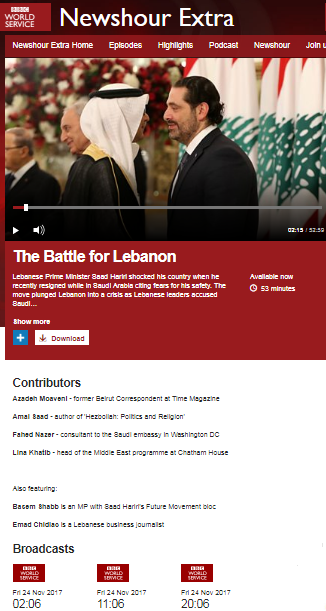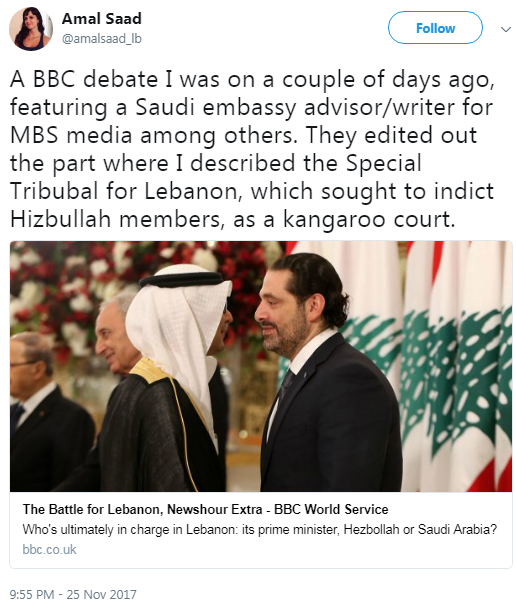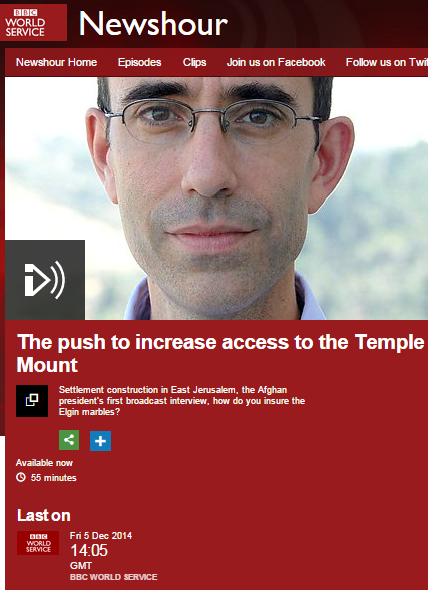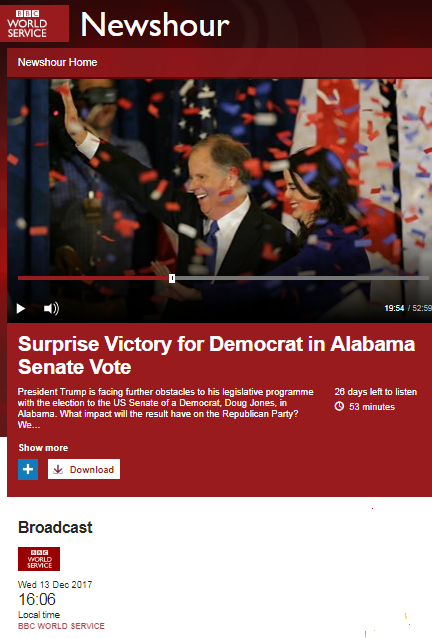The November 24th edition of the BBC World Service radio programme ‘Newshour Extra’ was titled “The Battle for Lebanon“.
“Lebanese Prime Minister Saad Hariri shocked his country when he recently resigned while in Saudi Arabia citing fears for his safety. The move plunged Lebanon into a crisis as Lebanese leaders accused Saudi Arabia of forcing him to go. It has also stoked fears of major showdown between Lebanon’s Saudi-backed Sunnis and the Iranian-backed Shia militant group Hezbollah. On his return to Lebanon this week, Hariri agreed to withdraw his resignation and seek ‘dialogue’. So who is ultimately driving events in Lebanon, Hariri, Saudi Arabia, or Hezbollah and Iran? On Newshour Extra this week Owen Bennett Jones and his guests discuss what Saudi Arabia wants in Lebanon and whether it’s gearing up to take on Hezbollah at all costs.”
Owen Bennett Jones’ guests were American-Iranian journalist Azadeh Moaveni, Lina Khatib of Chatham House, Fahad Nazer – a consultant to the Saudi Arabian embassy in the US capital and the Lebanese academic Amal Saad who – as was the case when she appeared on two editions of ‘Newshour’ a fortnight before – was inadequately presented to listeners as an “author”.
The first topic of discussion was the background to Hariri’s resignation and in Amal Saad’s contribution listeners heard her dismiss Hariri’s claims of threats to his life, whitewash Hizballah involvement in the murder of his father and yet again – despite Hariri having returned to Lebanon by the time this programme was aired – repeat Hizballah spin concerning his supposed ‘abduction’.
[emphasis in italics in the original, emphasis in bold added]
03:46 – Saad: “Well first of all to address the threats, the Lebanese security services – all three of them – issued different statements saying there was no threat on his life. So that was clearly a bogus threat charge to be honest. And as to what Fahad is saying about all signs point to Hizballah being behind the assassination of Rafik Hariri, you know Hizballah hasn’t actually been charged with anything yet so I wouldn’t really, you know, use that of evidence of anything. If anything, you know, Saad al Hariri’s abduction by Saudi Arabia which – and I think there’s a virtual international consensus on this, including the German foreign minister – was indeed kidnapped by Saudi Arabia and is still a political hostage. His family are still there – clearly used as collateral – and I think, you know, the very fact that Hariri rescinded his resignation was done in concert with Saudi Arabia who realised – specially Mohammed bin Salman – that he overplayed his hand and had to back down basically.”
Later on in the programme (from 12:00) Bennett Jones asked Saad to explain Hizballah to listeners.
Bennett Jones: “…and Amal Saad; you’ve written a book on the organisation. I think it would help – just for people, you know, who really aren’t familiar with Hizballah – can you explain? First of all, it’s both a military and a political outfit, right?”
Listeners consequently heard a highly airbrushed portrayal of Hizballah that misrepresented its origin as being rooted in the (completely unexplained) First Lebanon War and – unsurprisingly – failed to tell those listeners “who really aren’t familiar with Hizballah” anything at all about the reasons for its designation as a terror organisation by many Western and Gulf countries as well as by the Arab League.
Saad: “That’s right. Hizballah arose as a response to the Israeli invasion of 1982. It’s a popular grassroots movement. So in the first sense it is a resistance movement. And over time Hizballah’s constituency expanded to encompass the overwhelming majority of Lebanese Shia. And obviously it has supporters in other sects as well: Christians and some Sunnis. And Hizballah in 1992 contested parliamentary elections. It’s had a parliamentary role since then and a government role since 2005 when Syria withdrew from Lebanon. So I would say yes, Hizballah is a military organisation. I would call it a resistance army actually. It has also the tactics and weapons and strategy of a conventional armed force. So yes, it’s both.”
Without bothering to clarify to listeners that Hizballah actually has had nothing to ‘resist’ since Israel disengaged from southern Lebanon seventeen and a half years ago, Bennett Jones went on:
Bennett Jones: “Now it’s a very unusual organisation but what you’ve just touched on is a key point. There is a Lebanese army and yet you’ve also got this – as you say – almost like an army but without the normal political control or command structures.”
Saad: “Well there’s a very close relationship between the Lebanese army and Hizballah actually that’s been going on for well over a decade now. Both Hizballah and the Lebanese army coordinate, cooperate vis-à-vis Israel on Lebanon’s southern border and they’ve been cooperating a lot more recently in terms of the takfiri jihadis from Syria. So there’s ongoing cooperation in that sense and at the same time, if you’ve noticed that Lebanon has suffered far fewer terrorist attacks; especially since 2014 we haven’t seen any terrorist attacks in Beirut and that’s thanks to the very close coordination between Hizballah’s intelligence, Lebanese military intelligence, internal security. So there’s that kind of ongoing cooperation on homeland security issues as well.”
Obviously that evasive and highly partisan reply did not provide listeners with any understanding of the role played by Hizballah’s foreign-funded, heavily armed militia in its imposition of a state-within-a state model in Lebanon.
Later on in the programme (from 19:14) listeners were told by Saad that Hizballah “hasn’t had any kind of role in Yemen in terms of sending weapons” but she did clarify that Nasrallah admitted to sending “weapons to the Palestinians”. When Bennett Jones asked her about the possibility of Hizballah “pull[ing] back from the regional stuff] her response was again to repeat Hizballah talking points.
Saad: “Obviously Hizballah’s regional role in terms of…if we’re talking about regional role…Palestine, Syria is not up for negotiation because these are existential issues for Hizballah. Hizballah fighting Israel is existential, supporting the Palestinian cause is both ideological and existential – it’s strategic. And also, you know, continuing with its military role in Syria is also existential in the sense that it was not a spillover. These groups were actually attacking Lebanese civilians who were residing in Syrian villages, in Syrian towns across the border from Lebanon. There were thousands of Lebanese and this is why Hizballah intervened; they had to protect themselves.”
Bennett Jones refrained from questioning or challenging that debatable representation of events.
At 31:02 Saad made two additional references to “Hariri’s arrest” in Saudi Arabia and at 34:24 – following a question from Bennett Jones concerning the likelihood of the use of economic pressure on Lebanon by Saudi Arabia, listeners heard Saad present speculation as fact:
Saad: “I think that’s the Saudis’ only card at this point. Their other card…well initially their card was that Israel would, you know, do the fighting for them and that didn’t work out for them.”
Towards the end of the discussion (from 48:25) listeners heard Saad misrepresent the origins of Hizballah once more, together with an airbrushed presentation of the relationship between the terror group and Iran.
Saad: “Another thing is I think we’ve got to stop looking at…you used this term yourself, Owen – you said proxy. […] Hizballah is not a proxy. None of Iran’s allies are actually proxies. And we have to look…try to be a bit more academic here in terms of defining what do we mean by proxy warfare. What does a proxy…you know, what’s the definition? You know Hizballah was born as a result of the Israeli invasion. That doesn’t make it a proxy at all. In fact it’s the exact opposite. Iran does not control it. Proxies are controlled by their benefactors. This is not happening. There is an alignment of interests, an ideology and there is financial support but then that happens with the US’s allies. They receive funding and arms from the US. No-one calls them proxies. So there’s a difference between a proxy and a junior partner. I would say Hizballah is a junior partner of Iran.”
If, as one must assume, the purpose of this programme was to enhance audience understanding of the complex story of Hariri’s resignation, his subsequent backtrack and the wider regional background, then clearly an accurate and impartial portrayal of Hizballah’s history, ideology and activities should have been one of its essential components.
While Amal Saad was on occasion challenged by some of the additional contributors on various other points, the fact that Owen Bennett Jones assigned the task of ‘explaining’ Hizballah to an obviously partisan contributor, intent only on repeating the terror group’s own propaganda and messaging, actively hindered audience comprehension of this story.
Related Articles:
BBC WS radio listeners get unchallenged Hizballah messaging – part one
BBC WS radio listeners get unchallenged Hizballah messaging – part two
Reviewing BBC portrayal of Hizballah in Hariri resignation reports
Unnecessary BBC correction does a makeover on Nasrallah




